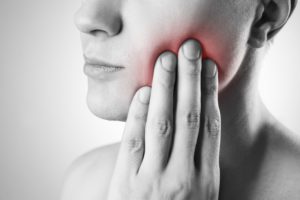 Have you ever felt a weird tingling sensation in your teeth randomly throughout the day? Did you notice if it was right after you took a sip of your favorite hot tea or eating a spoonful of ice cream? This sensation is a very common dental occurrence known as tooth sensitivity, according to your dentist in Irving.
Have you ever felt a weird tingling sensation in your teeth randomly throughout the day? Did you notice if it was right after you took a sip of your favorite hot tea or eating a spoonful of ice cream? This sensation is a very common dental occurrence known as tooth sensitivity, according to your dentist in Irving.
In some cases it’s expected, but in others it should be addressed by a dentist for closer examination. Keep reading to learn the most common causes!
Your Oral Care Habits
Did you know that brushing with too much force can, not only cause your gums to recede, but wear down your tooth enamel? Many patients hold the misconception that brushing harder or for longer can remove more plaque, but in reality, brushing gently for about two minutes at a time is all that’s needed to remove plaque from the surface of teeth.
If you use whitening toothpaste often, excessive amounts of mouthwash, or use a hard-bristled toothbrush, consider making a few changes as well. Use a soft-bristled brush instead, opt for a normal fluoridated toothpaste, and read the instructions on your mouthwash’s label for correct use.
You Grind Your Teeth
Those who suffer from bruxism, or chronic teeth grinding, are more likely to experience tooth sensitivity throughout their day. The constant grinding and clenching can significantly damage your teeth, especially when asleep. Consider purchasing a custom nightguard from your dentist to protect your teeth in the future.
You’ve Had a Recent Dental Procedure
Root canals, teeth whitening, and other procedures that affect tooth enamel typically come with a fair share of side effects. While some dentists have been working to reduce sensitivity associated with teeth whitening, nearly anyone who undergoes a root canal will feel some sensitivity as they recover.
While this sensitivity is normal, it shouldn’t last for more than a week. If it does, schedule an appointment with your Irving dentist.
Excessive Plaque, Gum Disease, and Decay
When large amounts of plaque start forming, it can begin to dissolve and expose the dentin layer underneath. The more enamel wears down, the more likely you’ll feel sensitivity, especially when eating hot, cold, or acidic foods. These can also contribute to dental erosion, so reduce your intake if sensitivity persists.
Gum disease can cause gums to recede, causing the tooth roots to become more exposed. Periodontal therapy can clean the roots and reduce these symptoms. Alternatively, decay around the edges of dental fillings can cause sensitivity. If you notice sensitivity coming from these specific areas, ask your dentist if they need replacing.
Your Tooth Has Cracked
If a tooth has cracked, either from bruxism or from a dental injury, it’s typically a dental emergency. This is especially true if the crack extends below the gumline. The best step to take is to schedule an appointment with your dentist to have the area restored. Failing to do so can lead to infection and eventually tooth loss.
Now that you know a few of the most common causes of sensitivity, you can reduce its occurrence. To learn more about treating and managing sensitivity, schedule an appointment with your dentist in Irving today!
About the Author
Dr. Rafiq Hirji earned his Doctor of Dental Surgery degree from the University of Southern California School of Dentistry. If you aren’t sure what’s causing your tooth sensitivity, he’d be more than happy to help you reduce and manage it effectively. To learn more about his practice, contact him through his website.
